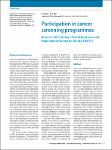Participation in cancer screening programmes
Results of the German Health Interview and Examination Survey for Adults (DEGS1)
Starker, Anne
Saß, Anke-Christine
A growing number of people in Germany participate in the cancer screening services offered by statutory health insurance. Using data from the first wave of the German Health Interview and Examination Survey for Adults (DEGS1), current levels of participation in cancer screening services were determined. DEGS1 (2008–2011) permits representative cross-sectional analyses to be performed. In DEGS1, persons who were entitled to different cancer screening services were interviewed on their awareness, participation and regular utilisation of cancer screening for different types of cancer. Overall, 67.2% of women and 40.0% of men participate regularly. Participation rates fluctuate to a great extent for individual types of cancer screening. Women participate in cancer screening more frequently than men do. For women, a better socioeconomic status was associated with higher participation rates. Participation rates improve with increasing age, meaning that the difference in participation rates between women and men becomes smaller. The current analyses present information on specifically targeted population groups to promote informed decision-making about cancer screening, so that participation rates can be improved further. The analyses thus provide an important basis for health policy measures.
No license information
Related Items
Show related Items with similar Title, Author, Creator or Subject.
-
2022-04-14ZeitschriftenartikelTime Trends and Income Inequalities in Cancer Incidence and Cancer-Free Life Expectancy – a Cancer Site-Specific Analysis of German Health Insurance Data Tetzlaff, Fabian; Hoebel, Jens; Epping, Jelena; Geyer, Siegfried; Golpon, Heiko; Tetzlaff, JulianeCancer represents a major burden of morbidity and mortality globally. So far, however, little is known on time trends and inequalities in the lengths of life spent free of any cancer. This study steps into this gap by ...
-
2022-02-22ZeitschriftenartikelIncidence of Smoking-Related Second Primary Cancers After Lung Cancer in Germany: An Analysis of Nationwide Cancer Registry Data Eberl, Marian; Tanaka, Luana F.; Kraywinkel, Klaus; Klug, Stefanie J.Introduction Approximately 80% of lung cancer cases in Germany are attributable to smoking. Patients with a lung cancer diagnosis may remain at increased risk of developing smoking-related second primary cancers ...
-
2024-10StudienarbeitColorectal cancer incidence, mortality, stage distribution and survival in European countries in the colorectal cancer screening era: Updated Results from an International Collaborative Study of Population-Based Cancer Registries Deutsches Krebsforschungszentrum (DKFZ)Specific research questions - *How has CRC incidence and mortality evolved with the implementation of various CRC screening programs in different European countries? - How is CRC detected across different European ...

